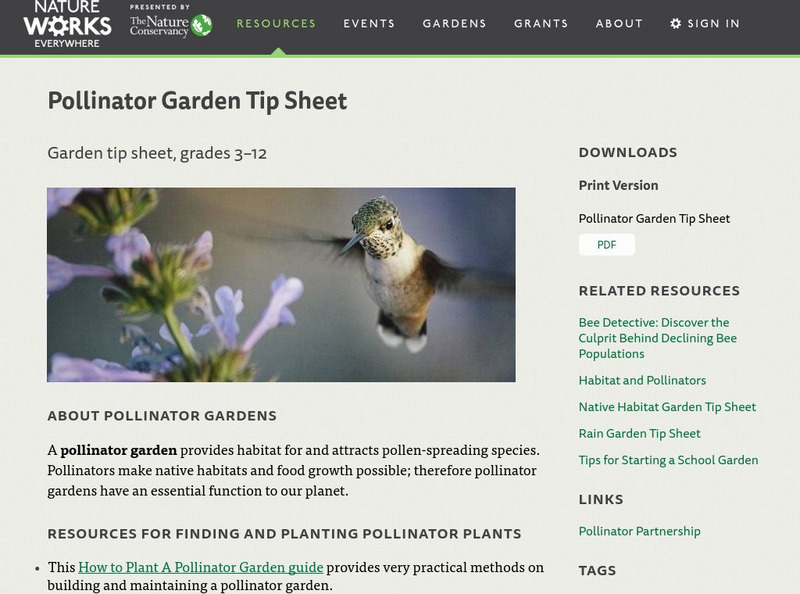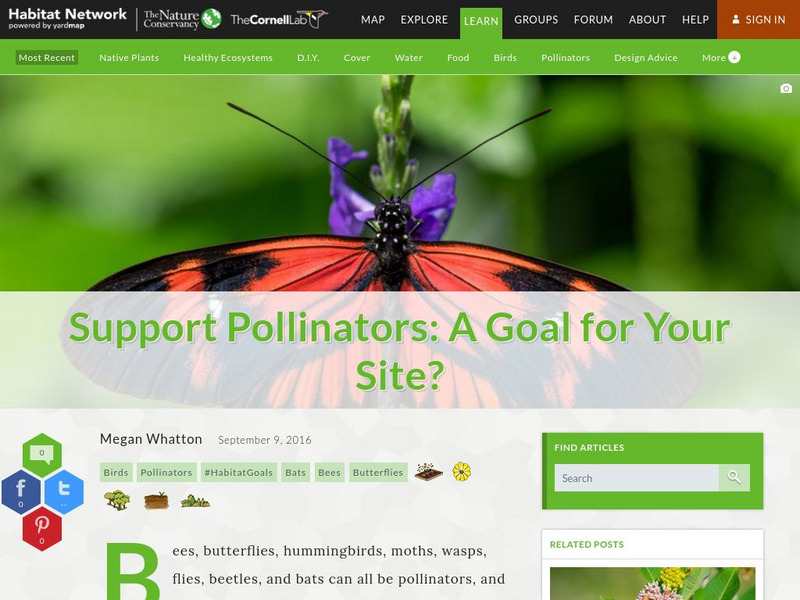Curated OER
Most Troublesome Exotic Invasive Plant Species Web Quest
Young scholars participate in a Web Quest activity in which they identify common exotic invasive plant species of the Southern Appalachian Region. After identifying the top 10 exotic invasive species, they choose one to research in depth.
Curated OER
Butterfly Lesson
Students identify that Idaho is a home to 168 species of butterflies and they are an important part of many habitats. They also identify how to use the Digital Atlas of Idaho and write a report regarding information of their assigned...
Curated OER
Adopt-An-Insect
In this biology worksheet, middle schoolers locate examples of various types of insects listed in the chart and receive a point value for each according to its significance. Then they identify body parts and habitat for each item.
Curated OER
Insects And Pests
In this insect worksheet, students determine whether 6 different affects from insects are good or bad. Students also write at least 3 beneficial insects and 3 pests.
Curated OER
Plant Parts Resource Pages
In this plant worksheet, students study the names of plant parts and the function of each part. There are no questions associated with this page.
Curated OER
I Think, Therefore
Learners ponder a quote from Charles Darwin. In this logical thinking lesson, students explain the statement, "The price of butter depends on the number of old maids in the area."
Curated OER
Mixed Prepositions 17
In this preposition learning exercise, students fill in blanks in sentences, clicking on a "check" button for immediate feedback. A reference web site is given for additional activities.
Curated OER
Plant Party
Students identify plant parts. In this plants lesson, students bring in a vegetable. Each student classifies which part of the plant their vegetable comes from (flower, root, ect.) Students identify the parts of their vegetable and later...
Curated OER
Breaking News English: The Mystery of America's Vanishing Bees
In this English worksheet, students read "The Mystery of America's Vanishing Bees," and then respond to 47 fill in the blank, 7 short answer, 20 matching, and 8 true or false questions about the selection.
Curated OER
Photosynthesis and Plant Reproduction
Students explain the process of photosynthesis. In this biology lesson, students label the different reproductive parts of the flowers. They watch a short video then identify the leaf parts on the board.
Curated OER
Catch as Catch Can
Students investigate insects. For this insect analysis lesson, students catch insects using nets they make. They identify the insects they catch and create a chart to show the numbers and varieties. This lesson includes a vocabulary list...
Curated OER
Spelling List 7: Sight Words, al/el, and Academic Vocabulary
In this spelling activity, students copy a set of 21 words two times each. Words are sight, academic or have the al/el sound. A website reference is given.
Curated OER
Caterpillar Camouflage
Students list animals, plant parts, and reasons for caterpillars to camouflage themselves. In this animal and plant adaptations lesson plan, students also play a game where they use colors as camouflage.
Discovery Education
Discovery Education: Pollination Parties
This lesson helps learners understand the concept of pollination. Objectives, materials, procedures, adaptations, discussion questions, evaluation, extensions, suggested readings, links, vocabulary, and academic standards are all included!
Encyclopedia of Earth
Encyclopedia of Earth: Botany: Pollination
Scientific article detailing what pollination is, types of pollination, animals (mainly insects) that facilitate pollination, ways pollination can take place, its evolution, pollination in agriculture, and threats to pollination....
Other
Nature's Partners: Pollinators, Plants, and You [Pdf]
Teachers will love this comprehensive Grades 3-6 curriculum on pollinators. There are six modules of detailed plans and accompanying materials. Pre-assessment activities and teacher background information, as well as supplemental...
Smithsonian Institution
Smithsonian Learning Lab: Plants and Animals: Partners in Pollination
Smithsonian Education presents a series of three lesson plans whose focus is plants and animals in their role as partners in pollination. Each lesson comes complete with clear learning objectives, materials list, subjects covered,...
TED Talks
Ted: Ted Ed: The Hidden Beauty of Pollination
Pollination is a vital to life on Earth but largely unseen by the human eye. Filmmaker Louie Schwartzberg shows us the intricate world of pollen and pollinators with gorgeous high-speed images from his film "Wings of Life," inspired by...
Missouri Botanical Garden
Missouri Botanical Garden: Biology of Plants: Pollination
Learn the parts of a flower and how a plant gets pollinated. Includes video, songs, diagrams, and lesson plans.
Nature Conservancy
Nature Works Everywhere: Pollinator Garden Tip Sheet
Certain creatures help pollinate plants. This guide will help gardeners plant good pollinator plants.
Smithsonian Institution
Smithsonian in Your Classroom: Plants and Animals: Partners in Pollination
A lesson unit on pollination. Includes background information, lessons and activity pages. One handout is in Spanish.
Other
Science Learning Hub: Pollination: Attracting Pollinators
Flowers are dependent on various means to transport their pollen. Transfer by animals, insects, birds, bats, and wind are five methods for pollination to occur that are described here.
Cornell Lab of Ornithology
Habitat Network: Pollinators at Home: Intro to Pollinator Gardening
Find out how to provide native plants that foster the activity of insects and other pollinators.
Cornell Lab of Ornithology
Habitat Network: Support Pollinators: A Goal for Your Site?
Find out the three easy steps citizens can take to support pollinators including providing shelter and nesting materials, food, and avoiding using chemicals like pesticides and fertilizers.
Other popular searches
- Bees Pollination
- Flower Parts and Pollination
- Pollination Flow Chart
- Cross Pollination
- 6 Steps of Pollination
- Pollination Activities
- Pollination Flowchart
- Pollination Process
- Pollination and Fertilization
- Plants Pollination
- Cross Pollination
- Plants Cross Pollination


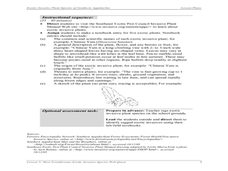






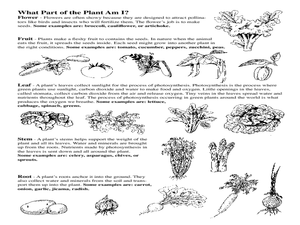





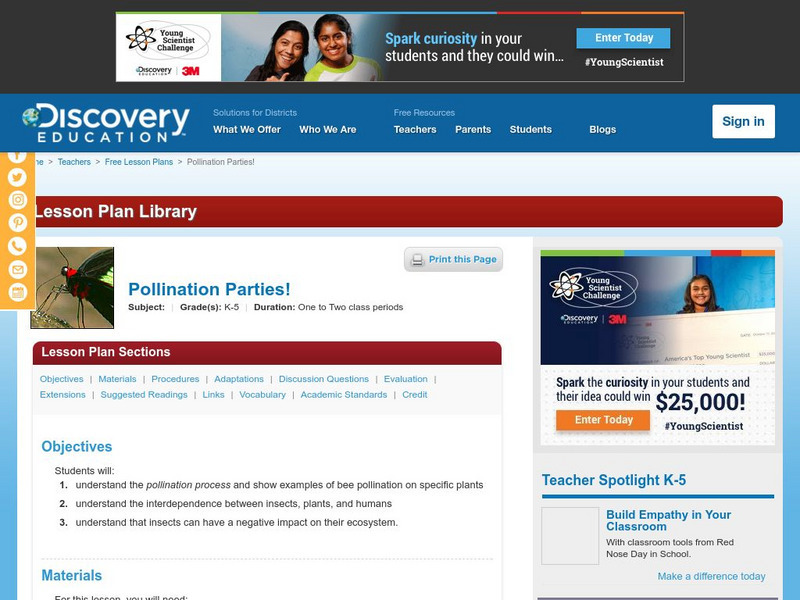
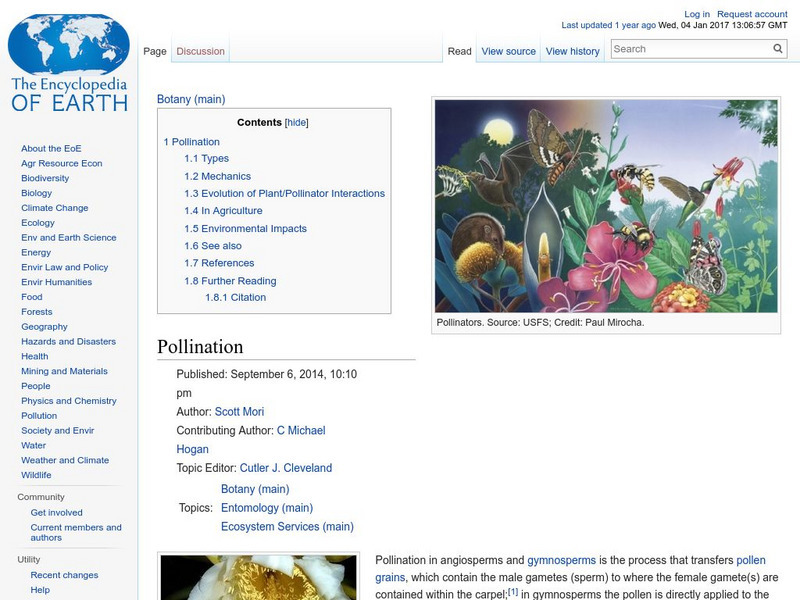
![Nature's Partners: Pollinators, Plants, and You [Pdf] Unit Plan Nature's Partners: Pollinators, Plants, and You [Pdf] Unit Plan](https://d15y2dacu3jp90.cloudfront.net/images/attachment_defaults/resource/large/FPO-knovation.png)

